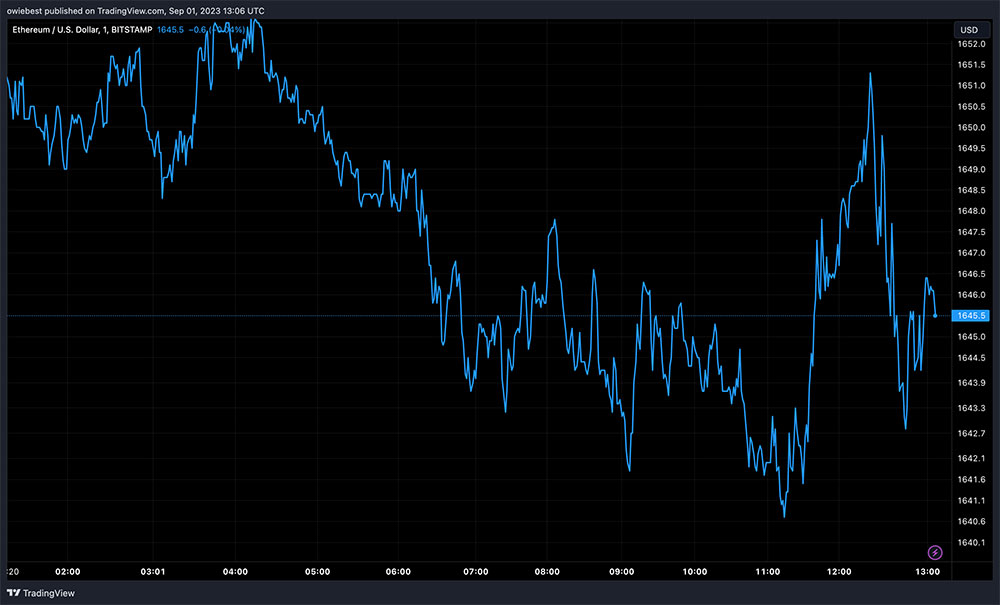Large Ethereum stakers have voluntarily committed to a self-limit rule that would cap the extent of their network staking operations at a predetermined threshold in an effort to safeguard decentralization and promote responsible and sustainable blockchain growth.
Stakers of Ethereum Agree to a 22% Self-Limit Rule
Superphiz.eth, an advisor on community health for the Ethereum Beacon Chain, revealed that four significant Ethereum staking providers have committed to a self-limit rule or are actively working toward it in a post on X (formerly Twitter) on Thursday, August 31. The staking provider’s staking limit would be lowered to less than 22% under this self-limit rule.
Stay in the know on crypto by frequently visiting Crypto News Today
The self-limit rule has been endorsed by a number of staking service providers, including Rocket Pool, Stader Labs, Diva Staking, and StakeWise. After this, a few other staking companies are anticipated to offer comparable guarantees regarding Ethereum staking.
The self-limit commitment is viewed as a proactive measure to prevent overcentralization in the Ethereum ecosystem while preserving the blockchain’s long-term viability.
In 2022, Superphiz.eth initially suggested the self-limit rule, stating that the rule’s 22% cap was put in place to protect the network’s decentralization. This is so that a rogue chain cannot be “finalized” without 66% of validators controlling more than 2/3 of the blockchain’s staking power. So it becomes more difficult for one validator to control the entire network.
CryptoCaster Quick Check:
According to the Ethereum supporter, the chain will remain successful by encouraging trust and unity over possessiveness thanks to the Ethereum staking providers’ demonstrated accountability and commitment.
Superphiz stated that these providers “are committed (or are in the process of committing) to self-limit to approximately 22% of Ethereum validators.” “We’ll succeed as a chain if we do these things: Above all, put cooperation. collaborative efforts as opposed to winner-take-all.
Highlighting Verbal Commitment’s Uncertainty in the Community
Several members of the Ethereum community have highlighted the lack of reliability that results from a verbal commitment to the self-limit rule in response to Superphiz.eth’s announcement regarding the self-imposed limit on Ethereum staking providers.
Making verbal pledges, according to one member of the community, is simple, especially when the groups subject to the self-limit regulation stake much less than the 22% maximum.
When it appears that the majority of them will probably never achieve 22% market share of Liquid staking on Ethereum, it is simple to commit to self-limitation. People in the ETH community shouldn’t disparage more usable solutions as opportunistic goods, he said.
With a total of 32.4% staked Ethereum, Lido Finance currently leads the market with one of the highest staking rates. The self-limit on ETH staking was previously opposed by 99.81% of the platform’s stakeholders.
After that, Superphiz.eth highlighted how crucial it was to stop Lido from acquiring further holdings and obtaining a 33% part of the market. According to him, penalties could be imposed to safeguard the blockchain from a power imbalance that could significantly affect Ethereum’s consensus process if they eventually reach 33% of all ETH invested.
“I believe preventing them from getting 33% is the first step. If they gain 33%, I’d look into protocol-level sanctions; if not, who knows what might come next? As mentioned by Superphiz.eth.![]()
We hope you appreciated this article. Before you move on, I was hoping you would consider taking the step of supporting CryptoCaster’s journalism.
From Elon Musk, Larry Fink(BlackRock) to Jamie Dimon(JP Morgan Chase) a number of billionaire owners have a powerful hold on so much of the hidden agendas’ which eludes the public concerning the paradigm shift juxtaposed by cryptocurrency and web3 emerging technologies. CryptoCaster is different. We have no billionaire owner or shareholders to consider. Our journalistic efforts are produced to serve the public interest in crypto development and institutional disruptions – not profit motives.
And we avoid the trap that befalls much U.S. and global media – the tendency, born of a desire to please all sides, to engage in false equivalence in the name of neutrality and retail consumer protection. While fairness and transparency dictates everything we do, we know there is a right and a wrong position in the fight against fiat global banking interest and monetary reconstruction precipitated by the emerging crypto ecology.
When we report on issues like the FTX, Binance and Ripple crisis, we’re not afraid to name who or what is uncovered. And as a crypto sentinel, we’re able to provide a fresh, outsider perspective on the global monetary disruption – one so often missing from the insular American and European media bubble.
Around the world, readers can access the CryptoCaster’s paywall-free journalism because of our unique reader-supported model. That’s because of people like you. Our readers keep us independent, beholden to no outside influence and accessible to everyone – whether they can afford to pay for news and information, or not.
We thankyou for the on-going support our readers have bestowed monetarily. If you have not considered supporting CryptoCaster, if you can, please consider supporting us just once from $1 or more of Bitcoin (satoshi) or Eth, and better yet, support us every month with a little more. Scroll further down this page to obtain CryptoCaster’s wallet addresses.
Thank you.
Kristin Steinbeck
Editor, CryptoCaster
Please Read Essential Disclaimer Information Here.
© 2024 Crypto Caster provides information. CryptoCaster.world does not provide investment advice. Do your research before taking a market position on the purchase of cryptocurrency and other asset classes. Past performance of any asset is not indicative of future results. All rights reserved.
Contribute to CryptoCaster℠ Via Metamask or favorite wallet. Send Coin/Token to Addresses Provided Below.
Thank you!
BTC – bc1qgdnd752esyl4jv6nhz3ypuzwa6wav9wuzaeg9g
ETH – 0x7D8D76E60bFF59c5295Aa1b39D651f6735D6413D
MATIC – 0x7D8D76E60bFF59c5295Aa1b39D651f6735D6413D
LITECOIN – ltc1qxsgp5fykl0007hnwgl93zr9vngwd2jxwlddvqt
CRYPTOCASTER HEATMAP






